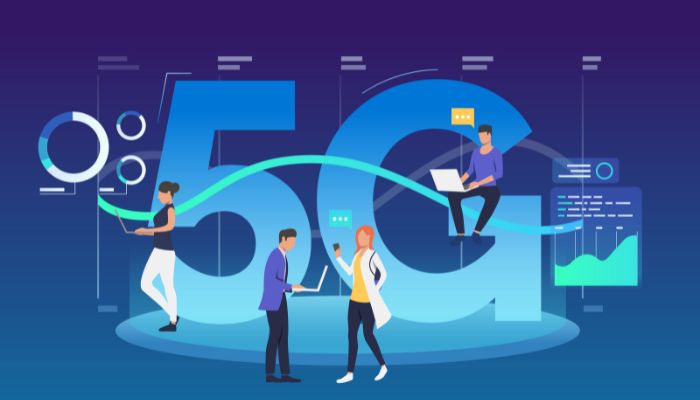During the 6th edition of the India Mobile Congress held in Pragati Maidan, New Delhi, Prime Minister Shri Narendra Modi launched 5G services on October 01, 2022. He said, “New India will not remain a mere consumer of technology, but India will play an active role in the development and implementation of that technology”. With 5G rollout in select cities in India, the country heralds a new economic boom. With the advent of cutting-edge technology such as this, one can expect transformational progress in the way we conduct business, in how we communicate, and the very face of consumerism.
How 5G rollout will impact businesses
If you think your binge-watching of OTT platform content has been rather pleasant, think again. With 5G rollout, streaming services will only get better. Of course, high-speed and premium-quality internet is a given with 5G. It’s the least one can expect, right?
But, that’s not the only overarching advantage of this leap in technology. 5G can now enable and help achieve business objectives in many ways. In fact, it’s going to be a critical part of all business strategies. The transactions we make and the processes we follow through applications and software in our computers, and especially our smartphones will only soar. The quicker the option to purchase, the faster a business will expand.
You might also be interested to read: Onboarding Isn’t Enough: Cultural Integration of New Executives is a Holistic Venture
Likewise, the smoother the content-consuming experience, the more engagement and viewership. As we inch closer to the Metaverse becoming more than a virtual reality, 5G will now propel revolutionary tech ideas in augmented and virtual reality, making the IoT more accessible and “real”.
4G gave us the gift of faster and more reliable payment processes, enhanced social networking, and mass video streaming. The predictable progression for it was to evolve into 5G. GSMA’s Study on Socio-Economic Benefits of 5G Services Provided in mmWave Bands shows that 5G could potentially contribute $565 billion to the global economy by 2034.
Apart from clear-cut advantages like faster speed, future-friendly devices, and infinite avenues opening for a more seamless and robust customer experience, 5G is capacitating many unique approaches. Deloitte’s Enterprises Building Their Future with 5G and Wi-Fi 6 study shows that IT leaders worldwide are embracing 5G for a host of other reasons that are strictly not limited to technological advancements.
Leadership teams are now banking on 5G-driven developments to make better decisions in the workplace, including that of finding ways to reduce costs. New business models and strategies are taking birth every second while improved customer interactions are now the driving force behind new products and services.
As a surprising yet necessary capability, advancement in 5G tech may also help propagate an enhanced employee experience.
Is India ready for 5G?
An Invest India article states that the telecom industry in India is the second largest in the world. The subscriber base for both wireless+wireline subscribers stood at 1.17 billion as of August 2022. As we move towards a more wireless technological future with the advent of 5G, the already high teledensity of the urban market may increase further than the present 134.71%.
With a growing need and dependence on new-age technologies like 5G, big data, cloud computing, machine learning, artificial and robotics, it’s safe to say that India is inching towards a cohesive telecommunication revolution.
While consumers and businesses may be gearing up full-throttle to leverage all that 5G has to offer, are leadership and management teams across organisations addressing the glaring skills gap in the telecom engineering market and industry?
The Telecom Sector Skills Council (TSSC) report for the Indian Telecom Market 2022-23 puts forth riveting insights and a peek into what we can expect in the years to come. The cellular phone and device market alone employed 7.5 lakh people in 2020 and forecasted hiring about 60,000 more people in 2021. By 2025, it could potentially convert to a $19,000 crore opportunity.
Likewise, IoT and 5G will now boost a demand for talent in India’s telecom sector by 20% in 2022. The report also shows that the telecom industry as a whole witnessed a 15% increase in demand for talent, with the India Data Center Market to grow at a CAGR of 10.7% by 2027. With the development of newer technologies, the demand for cloud solutions is growing exponentially, creating over 40% more employment opportunities in 2020 as compared to 2019.
However, there is an undeniable skills gap. In March 2022, the 5G industry created 23,800 roles but there was only a ready supply of 15,800 talents, according to the same TCCS report. Similarly, the digital talent in the telecom sector is 1.06 lakhs but the demand stands at 1.47 lakhs. Unsurprisingly, male employees make up the majority (more than 70%) in every job function.
The way forward
The only way forward for the telecom engineering industry forward is to build and implement a robust hiring strategy to address the skills gap in the market, with a keen focus on also improving DEI practices in the workplace. TSSC already has plans to boost the telecom skill talent pool with stakeholders and partners involved with a core focus on building many more centres of excellence.
For 5G to sustain and operate at capacity, it will need supporting talent in varied roles for further development. Organisations across India must take early steps to create roles to fill for radio frequency systems architects and engineers, 5G open access network specialists architects, artificial intelligence and machine learning specialists, along with user experience researchers and designers.
As India heralds a new technological boom on an unprecedented scale, businesses and organisations must gear up and face the race to success with robust talent and harness the powers of 5G. 5G isn’t just about faster internet or faster streaming services. It’s going to change the very mould of decision-making for quicker turnover times. The faster the decision-making process, the quicker the results, and the better for businesses.
References:
- PM launches 5G Services | PM India | October 01, 2022
- The WRC series | Study on Socio-Economic Benefits of 5G Services Provided in mmWave Bands | GSMA | December, 2018
- The Benefits of 5G for Business | The Forecast by Nutanix | August 4, 2022
- 5G rollout boosts demand for talent with niche skills | The Times of India | October 10, 2022
- Overview: Indian Telecom Market 2022-23 | Telecom Sector Skill Council
- Enterprises building their future with 5G and Wi-Fi 6 | Deloitte Insights
You might also be interested to read: 10 Key Onboarding Metrics to Maximise Employer-Employee Success






